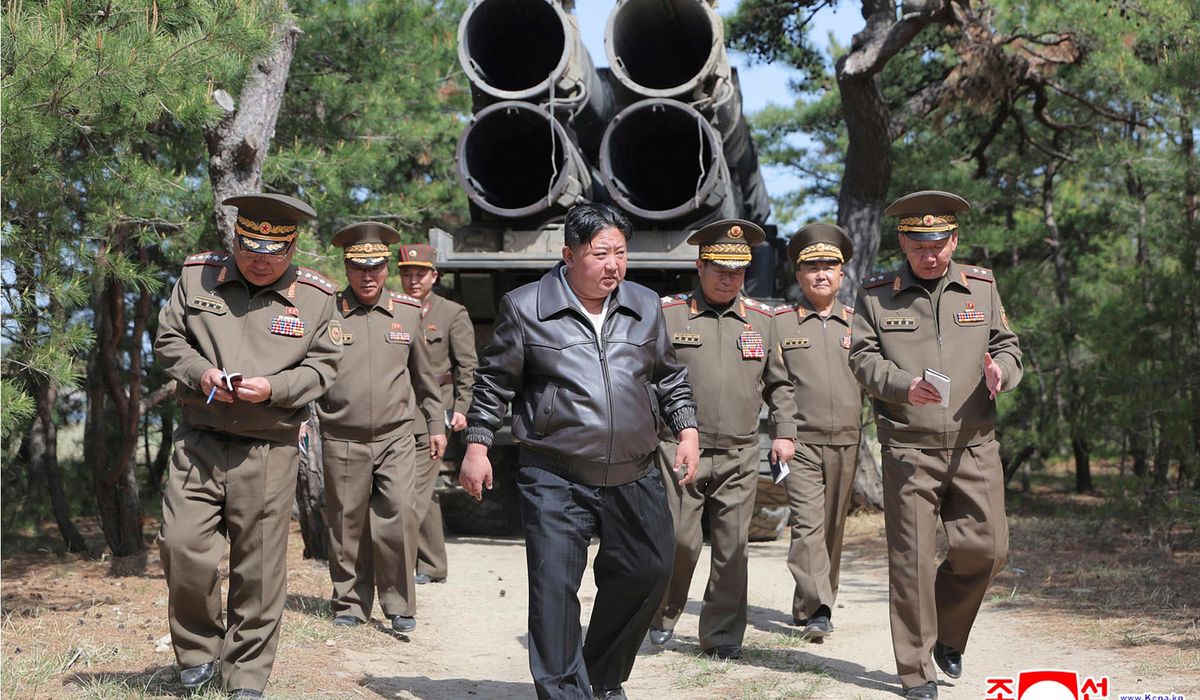


The successful use of B-2 bombers and Tomahawk missiles to destroy nuclear facilities in Iran has not diminished the Trump administration’s interest in diplomacy when it comes to North Korea. But the U.S. military action in the Middle East has likely bolstered the Kim Jong-un regime’s view that its nuclear and missile programs are key to its survival.
State Department spokeswoman Tammy Bruce, asked by a reporter if the Iran raids were a message for North Korea, said the Trump administration wants the complete denuclearization of North Korea.
“President Trump, in his first term, made significant outreach to North Korea. And what I can say, of course … they’ve got their own nuclear program in North Korea, that we remain committed to the complete denuclearization of North Korea, that remains a commitment,” Ms. Bruce said.
“If the North Korean nuclear issue can’t be resolved through dialogue … I’m not going to speculate on hypotheticals at this point,” she said.
On Friday, Mr. Trump said he is willing to resume talks with North Korea.
“If there is a conflict with North Korea … we will resolve it,” Mr. Trump said.
Pyongyang, however, responded negatively two days later, with North Korean state media outlet Rodong Sinmun describing the United States as a “hostile force” and “outright robber,” signaling that the regime is not interested in dialogue.
“Despite the scheming of aggressive wars and the offensive of sanctions, our republic has never once lowered the banner of self-reliance,” according to the report.
A second article in the outlet stated: “The source of armed conflicts in Europe, the Middle East and global instability lies in the gangster-like violations of sovereignty by the United States and the West.”
Fresh intelligence details on North Korea’s nuclear and missile programs reveal Pyongyang is advancing despite the U.S. effort to seek denuclearization.
Details were made public recently in a report by a group of United Nations members known as the Multilateral Sanctions Monitoring Team.
The report made public May 29 said North Korea’s violations of Security Council resolutions related to nuclear and ballistic missile programs continued into 2025.
New developments include a 2022 North Korean law that calls for the preemptive use of nuclear weapons if deterrence fails and a directive by North Korean leader Kim Jong Un to “exponentially increase the production of nuclear warheads.”
That resulted in “intensified activities related to the production of fissile materials (both high enriched uranium and plutonium),” the report said.
Then in September 2024 and January 2025, North Korea disclosed images of Mr. Kim visiting uranium enrichment sites, including the Yongbyon nuclear power plant and its 5 megawatt reactor that operated throughout 2024 except for a period of refueling.
Reprocessing of fuel has likely begun at a laboratory at Yongbyon in January along with operation of a light water reactor there.
North Korean troops conducted exercises that practiced for nuclear strikes and in March 2023 state media showed a purported tactical nuclear warhead designated Hwasan-31.
The military was ordered to mass produce tactical nuclear weapons in December 2022 and, in August 2024, announced that 250 new tactical ballistic missile launchers would be fielded by that month.
Also shown on North Korea state media was a “nuclear trigger” system described as a “national nuclear weapons comprehensive control system.” The system was tested during a nuclear counterattack drill.
On missiles, the report said North Korea is also building hypersonic missiles and solid-fueled intercontinental ballistic missiles.
“This has been assessed to be part of North Korea’s broader plans to develop a variety of strategic weapons systems that also include nuclear attack submarines and surveillance and reconnaissance systems,” the report said.
ICBM testing also has continued in violation of U.N. sanctions. A solid-fueled Hwasong-18 ICBM was test-launched in 2023 and in 2024 a new solid-fuel Hwasong-19 ICBM was fired in a test.
State media called the Hwasong-19 an “ultimate version” of the long-range missile series, calling it “the world’s most powerful strategic missile.”
Mr. Kim said in April 2024 that the launch of the new Hwasong-16B missile had operationalized “putting all the tactical, operational and strategic missiles with various ranges on a solid-fueled, warhead-controlled and nuclear warhead-carrying basis,” according to state media.
North Korea also reported testing ballistic missiles with hypersonic vehicles in January 2024 and January 2025.
New transporter erector launchers were shown off in 2024, including a large, 12-axle road-mobile launcher for ICBMs.
Pyongyang is also developing new weapons in addition to its ballistic missiles, including nuclear-capable strategic cruise missiles, known as Hwasal-1 and Hwasal-2.
The Kim regime also claimed to test an unmanned underwater nuclear attack boat, dubbed Haeil.
To support its nuclear missiles, North Korea used its ballistic missiles to launch four military reconnaissance satellites in 2023. One satellite launch in May 2024 failed in a midair explosion shortly after liftoff.
The details were provided in an annex to the team’s first report on North Korea’s unlawful arms transfers to Russia.
The team is made up of government experts from the United States, Australia, Canada, France, Germany, Italy, Japan, the Netherlands, New Zealand, South Korea and the United Kingdom.
It replaced a U.N. Security Council panel of experts that ended in 2024 when Russia vetoed its extension.
• Bill Gertz can be reached at bgertz@washingtontimes.com.
